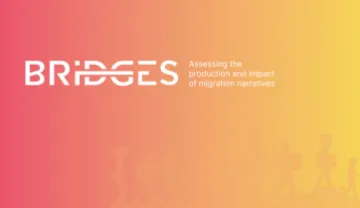BRIDGES Project Results: Production and Impact of Migration Narratives

After three years studying the production and impact of migration narratives, the BRIDGES project, coordinated by CIDOB (Barcelona Centre for International Affairs) and funded by the European Commission, presents its research results after analysing why some narratives end up being dominant over others in the media and social media, but also in political debates, and how these affect individual attitudes towards migration, as well as political decisions, at the national and European level.
The aim of the project BRIDGES: Assessing the production and impact of Migration narratives is to understand the causes and consequences of migration narratives in a context of increasing politicisation and polarisation, focusing on six European countries - France, Germany, Hungary, Italy, Spain and the United Kingdom - and placing the focus of the analysis on:
How narratives develop in traditional media and in social media.
The role of alternative voices (from the civil society) and their capacity to transform dominant narratives.
The transformative power of testimonial narratives and their capacity to influence how we feel and think about migration.
How narratives affect policy responses.
The impact of EU-funded information campaigns in Africa aimed at influencing the decision-making processes of potential migrants.
Responses to migration: The power of narratives versus facts
"Our responses to migration are not determined by facts, but by our interpretations of these facts", explains Blanca Garcés, Scientific Coordinator of the BRIDGES project, stressing that "as important as understanding reality is understanding how this reality is perceived". Migration narratives are the main object of study of this project, and to what extent "what is said, how, by whom, where and when explains part of the success of some narratives over others".
Below are the main findings of the BRIDGES project:
Personal stories generate identification and therefore empathy with migrants, while rapid media coverage that is far removed from the reality of migration does not help in creating this identification with migrants.
Acceptance of new arrivals is greater the less they are related to migration. This is the case of Latin American immigration to Spain, which arrives mainly through airports and is not perceived as a problem, far from the media spotlight and the spectacularisation of other borders.
In the media, the voices of politicians dominate. In contrast, the voices of migrants are almost absent.
Debates are increasingly dominated by far-right political forces and anti-immigration discourses. Their strategies are characterised by increased organisation, funding, coherence, regularity and the ability to introduce new issues into the debate.
Many political forces avoid talking about migration and, when they do, they end up responding reactively to anti-immigration discourses. As a result, they lose the possibility to steer the debate and often end up adopting anti-immigration positions for fear of losing the support of an electorate that is increasingly perceived as being against immigration.
Dominant media narratives shape policy debate. While policy discussion should remain at a more technical level, and thus away from more polarised and simplistic debates, the tendency is to mimic, with increasingly symbolic policies that seek to please potential voters rather than to address particular realities. Social media rarely introduce new issues, but they do replicate and amplify the narratives present in the media.
There are moments when either an unexpected event or the debate around a new law or court ruling opens a window of opportunity to transform dominant narratives.
EU information campaigns in Africa - success or failure?
The study concludes that EU information campaigns in Africa to discourage irregular migration to Europe are not effective because they do not take into account the circumstances and perceptions of potential migrants. "It is essential to understand that migrations are not individual projects but family projects" – explains Blanca Garcés, Scientific Coordinator of the BRIDGES project, and although migrants recognise the risks, the opportunities continue to outweigh them, "since the main source of information is the success stories of friends, family and acquaintances, especially through social media”.
During the three-years of the project (2021-2024), BRIDGES has adopted a collaborative and multidisciplinary approach, involving researchers from different disciplines and institutions from academia, civil society and artistic movements, with special attention to the inclusion of migrant voices. The results of the project are available through the project's social media accounts –Instagram, X, and YouTube channel– and on its website, which includes 32 Working Papers with national and comparative results, 3 Policy Briefs, a document with guidelines on how to include the gender perspective in the analysis of migration narratives, 7 op-eds reflecting on the most pressing issues in current public and political debates on migration, a toolkit to create more inclusive narratives and several multimedia outputs - 9 infographics, 11 videos and 3 podcasts. With the aim of creating more inclusive narratives on migration from an artistic perspective, the project organised also a hip hop and mural contest, organised by Fundación Contorno Urbano and the global association Hip Hop Works Inc., and the itinerant photo exhibition Out of Frame curated by ZONA.
BRIDGES: assessing the production and impact of migration narratives' is a project funded by the European Union under the framework programme for research and development H2020. The project has been implemented through a consortium of 12 institutions from different European countries under the coordination of the Barcelona Centre for International Affairs (CIDOB). Blanca Garcés, senior researcher and research coordinator at CIDOB, is the scientific coordinator of the project.
